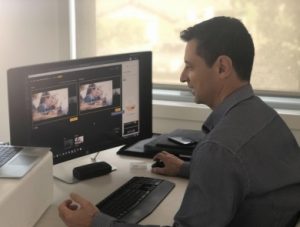ICT Update – Stay Smart Online
 I was in the car when my phone rang displaying No caller ID. My car was recently returned from the panel beater (after a minor accident – not my fault by the way) and I still hadn’t re-connected my phone to the Bluetooth system. The repairers had disconnected my battery. I was on the road and normally wouldn’t answer any calls but certainly not without a caller ID. It is usually somebody trying to sell me something or my boss trying to reach me. So, I hit the decline button and continued on my way. A minute later my phone dinged with a notification. Somebody had left me a message.
I was in the car when my phone rang displaying No caller ID. My car was recently returned from the panel beater (after a minor accident – not my fault by the way) and I still hadn’t re-connected my phone to the Bluetooth system. The repairers had disconnected my battery. I was on the road and normally wouldn’t answer any calls but certainly not without a caller ID. It is usually somebody trying to sell me something or my boss trying to reach me. So, I hit the decline button and continued on my way. A minute later my phone dinged with a notification. Somebody had left me a message.
Later, when I finally remembered to listen to the voice message (after all it could have been my boss) I heard a computer-generated voice say ‘Dial 1 to continue’. Given this was a voice message left on my phone clearly, I was unable to dial 1 and the call ended. That made me think – somebody did not leave me a message but rather something. 
Over the next couple of days, I received more No Caller ID phone calls with the same message, dial 1 to continue. I simply refused to answer these calls. I didn’t trust them. The media reports numerous stories about scams and cyber threats all the time. In fact, during COVID-19 there has been more recorded cybercrimes than in any other period.
The Australian Cyber Security Centre has reported malicious cyber actors actively targeting individuals and Australian organisations with COVID-19 related scams and phishing emails. In April they had received more than 95 cybercrime reports about Australians losing money or personal information to COVID-19 themed scams and online frauds. They have also found and disrupted over 150 malicious COVID-19 themed websites, with assistance from Australia’s major telecommunications providers, as well as Google and Microsoft. Innocent people searching for COVID updates or information were falling victim to these themed websites. Made to look like informative sites but with the intention to steal your information and identity.
Schools are not immune to cyber threats. We know that all too well and as such are much the wiser, better prepared and equipped to protect and respond to these threats. But that does not make us immune. Cyber crime is now the new criminal landscape. Organised crime has never been so easy and more worrying – so anonymous.
It would be foolish to think that cyber criminals are opportunistic creepy individuals working underground. Research and statistics tell us this is a well organised business reaching as far as the government in many countries – all in the name of national security. It would also be foolish to think that you have not already been scammed or will be in the near future.
So, you can understand my reluctance to answer these No caller ID calls with the computer-generated message dial 1 to continue. The sad reality is that we live in a world where we can trust no-one. Perhaps I am more sensitive and alert to cyber threats given my role as Director of ICT. I am the one forever putting out warnings and security information to everyone at our school. Only last week I posted an important message to the entire staff with the subject heading ‘Cybersecurity’. I feel like I badger them with the same repeated message;
- Never share your password or use the combination of your email address and password on an external website.
- Never respond to SMS messages asking to confirm your password.
- Improve your password strength. The more words the better. Use phrases rather than a word.
- Always question the legitimacy of emails.
- Think twice before opening attachments.
- You are never the 1 millionth visitor on the website and you will never win anything if you click here!
- Restart your laptop often. This will install any pending security updates.
- Restart your laptop often.
- RESTART YOUR LAPTOP OFTEN…
Still refusing to answer these calls I was about to make a complaint to my telecommunications provider when I received a phone call that did display a caller Id. I didn’t recognise the number but at least it was on display. Somebody, or something was not trying to hide.
It so happened my bank was calling me. I won’t mention which bank because I am about to give them a pasting. You see, my credit card payment was overdue. “You have not responded to our automated messaging system”, said the pleasant-sounding man on the line. “This is your final chance to make the payment before you incur a penalty charge”.
I was aghast. My bank, who I entrust to keep my finances secure and who periodically posts news and alerts on my App warning me of scams and threats, has used a dodgy looking automated messaging service to tell me I have an over due payment. Am I missing something here?
I was told by Michael (yes, we are on first name basis now) that had I dialled 1 to continue, the automated system would have prompted me to confirm my identity by asking me to press a series of other numbers. I was and I am still feeling dumbfounded by the ploy from my bank.
“Using an unidentified automated system to reach your customers in a time and landscape where cyber threats and scams are rife is most unintelligent”. Michael agreed.
My message to everyone out there is please question and think twice about any email, SMS or phone calls you receive. Please do things safely online; protect your passwords and your identity. Improve your security and conduct yourself responsibly on social media. Especially if you are young – inappropriate social media posts will always come back to bite.
To assist you I recommend subscribing to the Australian Cyber Security Centre’s ‘Stay Smart Online’ program and follow them on Facebook or LinkedIn for regular warnings and updates about threats. You can find more information about this program here together with resources and links to help you stay safe.
P.S. To my boss. If you are reading this, I never intentionally ignore you when you block your number or forget to enable caller ID. I just don’t know who you are!


